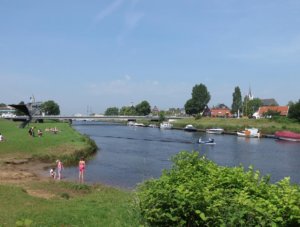UT Coalition for Resilience to Drought & Water Scarcity
The university coalition for resilience to drought and water scarcity is an interfaculty working group under the Climate Centre representing the five UT faculties. Its purpose is to mobilise, combine and strengthen the university’s excellence in research, education, capacity building and knowledge dissemination for strengthening resilience to drought and water scarcity in our region and beyond. The focus is on:
- reducing dependence on freshwater;

- improving drought monitoring, prediction and response;
- increasing the availability of water for ecosystems and human activities;
- adapting land use to water availability;
- treating increasingly polluted water sources; and
- enhancing governance for adaptation and transformations.
In the region of Twente, the UT collaborates with regional stakeholders (among others Vechtstromen Water Board, Vitens drinking water company, the Municipalities of Enschede, Hengelo and Zwolle, and Saxion Univ. of Applied Sciences) on addressing these challenges to strengthen regional drought resilience.
The UT also supports drought resilience at the international level in collaboration with numerous partners around the world, particularly in the Global South, which is the focus of the geo-sciences faculty, ITC, in particular through the Centre for Disaster Resilience.
The UT's high tech - human touch approach
The coalition reflects the high-tech, human-touch approach of the university:
- “High tech” including the monitoring and modelling of key physical systems (water, water-soil, water-vegetation, water-atmosphere) and the technical solutions to improve the functioning of these systems to make them more drought resilient (high tech)
- “Human touch” including understanding the behaviour and interests of individual actors, multi-actor collaboration, and governance systems and promoting behavioural change, collaboration, governance instruments and business models to improve drought resilience.
The five UT faculties representing engineering, geosciences, natural sciences and social sciences all contribute to addressing aspects of understanding and addressing aspects of resilience to drought and water scarcity:
Challenges | Our Approach | Our Expertise (Examples) |
Reduce the negative impacts of drought and water scarcity | Reduce the dependence of sectors and users on freshwater | Water footprint; behaviour change; supply chain; diverse technologies; … |
Improve drought prediction & response | Sensors; modelling; remote sensing; disaster risk management; insurance schemes; governance arrangements; indicator development; …. | |
Improve use of water resources | Increase the availability of freshwater | Nature-based solutions; soil improvement; artificial recharge; behaviour change; innovative treatment technology; policy instruments; … |
Adapt land use to water availability | Modelling of water use; crop variation; water footprint; land use change; behaviour change; business models.... | |
Transformation to a drought-resilient society | Transdisciplinary collaboration for transformative change | Assessing and developing governance capacities; co-producing knowledge; cross-sectoral collaboration; transdisciplinary approaches to achieve transformative change... |
Improve knowledge for decision-making | Digital twin Earth; sensors; dashboard; resilience indicators… |
expertise of the five faculties
The Drought and Water Scarcity coalition is led by Lara Wöhler and represented by members from all five faculties, and supported by UT's Strategic Business Development:






